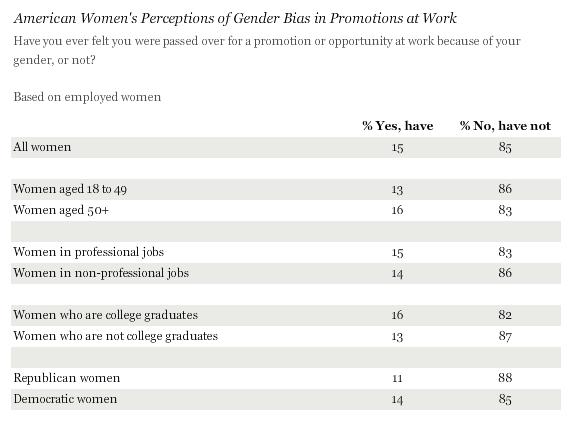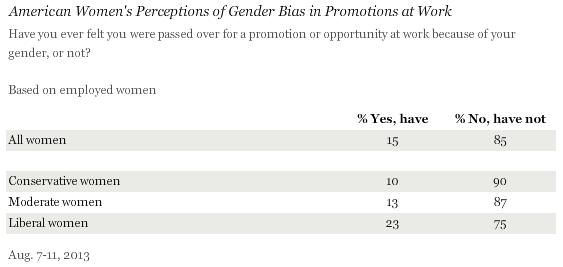There has been a ton of talk about the “fact” that women earn less than men in the market place.
Let’s forget that men die more on the job than women.
Let’s forget that men work more hours than women.
Let’s forget that men travel more than women.
Let’s forget all that.
When women were asked if they EVER have felt that they have been passed up for promotion because of gender, the answer is “No”.
There is no group o f women that even comes close to even 20% that feel they have been discriminated against based on gender.
Except one:
Yes.
Liberal women feel that they have been denied promotion more than twice the rate that conservative women do.
Why am I not shocked?




So, if one out of every seven women was denied a promotion based on her gender, you’d say that wasn’t a problem? Or, even just amongst conservative women, one out of every ten?
This gets past all your usual issues of “different kinds of work” and “career choices”, this is women in direct competition with men for the same job and they don’t get it based on their gender, and you feel that 15% demonstrates that there is no problem?
So, if one out of every seven women was denied a promotion based on her gender, you’d say that wasn’t a problem? Or, even just amongst conservative women, one out of every ten?
So, we’d like to live in a world where there is zero discrimination. So yeah, it bugs me that my wife might not be offered a promotion simply because she is a woman.
you feel that 15% demonstrates that there is no problem?
I’m simply saying that it’s less of a problem that is continually promoted in the media and perhaps isn’t enough of a problem to pass legislation that – as a result of which – will result in fewer women hired in the first place.
And let’s not forget, this is self reporting, this is not a study that takes into account the fact that women self select lifestyles that DO preclude them from promotion or pay. Those studies show that women have a 2% discrimination factor [though I do think that study is on wages not promotions].
My wife on occasion reports that she doesn’t make what she thinks she should, yet has turned down 3 promotions due to the fact that she would have to either move, travel or work such such a schedule that she wouldn’t see our kids.
I’m simply saying that it’s less of a problem that is continually promoted in the media and perhaps isn’t enough of a problem to pass legislation that – as a result of which – will result in fewer women hired in the first place.
Voter fraud: 1 out of 1,000,000 votes, maybe
Gender discrimination: 10-20 out of 100 women
The former is something that you want to reform, including instituting photo ID requirements that DO cost money.
The latter you consider to be overblown and don’t want a fix which will cost nothing.
And pray tell, why do you think fewer women will be hired in the first place? Because employers know they may have to pay them commensurate with their male counterparts?
And let’s not forget, this is self reporting, this is not a study that takes into account the fact that women self select lifestyles that DO preclude them from promotion or pay. Those studies show that women have a 2% discrimination factor [though I do think that study is on wages not promotions].
My wife on occasion reports that she doesn’t make what she thinks she should, yet has turned down 3 promotions due to the fact that she would have to either move, travel or work such such a schedule that she wouldn’t see our kids.
You completely missed the point of the poll question. It asked if they, personally, felt that they had ever been denied a promotion because of their gender. That isn’t about self-selection of lifestyles, or else they wouldn’t have been denied the promotion. Your wife, for example, turned down promotions, so she would have said “no” on this poll.
As for the self-selecting lifestyles, the question was clearly about promotions or opportunities they could have taken and didn’t get due to gender, not “jobs that were available but it didn’t work with my lifestyle.” How are you bringing that topic into it?
The latter you consider to be overblown and don’t want a fix which will cost nothing.
Fair point.
However, what is the “fix” that you are referring to?
And pray tell, why do you think fewer women will be hired in the first place? Because employers know they may have to pay them commensurate with their male counterparts?
Because women are being paid very close to what the fair market value is; within 2-3%. So, if an employer is forced to hire women at rates much higher than that 2-3% vig, they will opt not to hire them in the first place.
It’s the same reason that raising the minimum wage hurts the very people it’s meant to “help”.
It asked if they, personally, felt that they had ever been denied a promotion because of their gender.
You’re right, I slid between promotion and compensation. My bad.
How are you bringing that topic into it?
Ibid
It’s the same reason that raising the minimum wage hurts the very people it’s meant to “help”.
Even taking your minimum wage arguments as true, this is a different phenomenon. Minimum wage forces an employer to pay all employees at least $X. Gender discrimination laws say that you can’t pay Person A $X and Person B $X+10,000, simply because Person A is a woman. Both distort market forces for societal reasons; the first because we want to set a wage floor for living standards, the latter because we find it abhorrent to pay someone unequally for equal work. But minimum wage laws are a product of cost of living, and raising them affects input costs all around. Gender discrimination laws are a product of civil liberties, and increasing gender equality only raises costs that were artificially low due to discrimination. After all, discrimination is an artificial force on the market that has nothing to do with worker value and productivity. If we don’t take civil liberties into account, then it’s easy to lower the cost of labor-intensive products using, for example, slavery.
If you were told that a company discounted the wages of its black employees by even 5%, you’d have a problem with it, right? But if black people were getting equal pay, they’d get hired less often because they’re no longer a bargain! So really, shut up and take your sub-standard wages or we’ll go back to only hiring white people.
When the example is racial, it’s pretty easy for even republicans to see the problem, but when it’s women who suffer, there is the convenient excuse that it must be their own fault for wanting babies and mops and so forth, even though this poll shows discrimination without that factor.
Gender discrimination laws say that you can’t pay Person A $X and Person B $X+10,000, simply because Person A is a woman.
But does it take into account how many hours Person A and Person B work or are expected to work? Does it factor in how many weeks Person A will or won’t take off? How about sick days due to children being sick?
we find it abhorrent to pay someone unequally for equal work.
Except it’s not equal work.
If you were told that a company discounted the wages of its black employees by even 5%, you’d have a problem with it, right?
Except that there is no belief that black people are less likely to be as productive over time than white people. Which is not true of women and men.
Except that there is no belief that black people are less likely to be as productive over time than white people. Which is not true of women and men.
THIS, right here, is the problem. Women who do not plan to take time off for families or whatever are discounted because other women might. You’re right that there is a belief in many employers that women are less likely to be productive over time than men; that’s the discrimination that we’ve legislated against.
Except it’s not equal work.
What basis do you have for saying that? Equal pay for equal work is the standard under the equal pay act. The requirement isn’t that all women make the same as all men, it’s that you can’t pay a female welder less than a male welder (unless, for example, the male welder works in more hazardous conditions, or the female welder is working on less technically skilled joints, etc., in which case you can pay them differently).
But does it take into account how many hours Person A and Person B work or are expected to work? Does it factor in how many weeks Person A will or won’t take off? How about sick days due to children being sick?
Yes, it actually does take that into account. A woman working half-time doesn’t deserve the same salary as a man working full-time. Or vice versa. But she sure deserves the same hourly wage as him.
As for children being sick, what job do you have that gives you paid time off for taking care of sick children? And why doesn’t this affect men with children as much as women? The only basis you have here is that you are putting the child care responsibilities on the mother alone.
As for “weeks” they’ll take off, I’m not sure why you think women take off more time than men, unless you’re referring to maternity leave, which also doesn’t require paid leave under federal law.
Try approaching this from a perspective where men are expected to be the home caregivers and women are expected to work, and see if you’d still be okay with this disparity.
Try approaching this from a perspective where men are expected to be the home caregivers and women are expected to work, and see if you’d still be okay with this disparity.
THAT I resonate with. The problem is not one of discrimination by companies trying to snub women – that mentality is long gone and would be exploited by more fair minded bosses.
At play is the societal role of women – of which women buy into.
So, if you’re pissed that women make less than men, pass laws that change how societies feel, don’t pass laws trying to change the “laws of economics”.
The latter you consider to be overblown and don’t want a fix which will cost nothing.
However, what is the “fix” that you are referring to?
Lawsuits, of course. Lots and lots of lawsuits at no cost to the plaintiff so long as she feels like she was illegitimately passed-over for promotion. We will simply have judges decide on an as-needed basis who should work for whom and in what capacity. Problem solved.
We will simply have judges decide on an as-needed basis who should work for whom and in what capacity.
Sadly, yes, that is the “fix”.
Lots and lots of lawsuits at no cost to the plaintiff
Yes, because lawyers work for free, or because there’s so much contingency money in the pay difference between two levels of employment…
This is why we have the EEOC, who investigates these claims, they eliminate the subjectiveness that you seem to have a problem with.
But as far as your sneering that the floodgates will be opened to all these women who just “feel” like they’ve been discriminated against, what’s your solution? Is it, perhaps, to deny any recourse to women who’ve been denied fair employment opportunities? Can I hazard a guess at your race and gender?
You see, Pino? It’s all “who, whom?” for the Leftist…